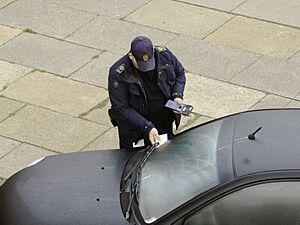Parking enforcement officer facts for kids
A parking enforcement officer (sometimes called a traffic warden or parking inspector) is someone who works for a city or police department. Their main job is to make sure people follow parking rules. They give out tickets when cars are parked in the wrong places or for too long. Sometimes, the term "parking attendant" is used, but that usually means someone who helps you park in a garage or lot.
Contents
What Do Parking Officers Do?
Parking officers help keep traffic flowing smoothly in cities. They make sure there are enough parking spots for everyone. They also help keep roads safe by making sure cars aren't blocking driveways or fire hydrants. Their work helps prevent traffic jams and makes it easier for people to get around.
Parking Officers Around the World
Parking rules and the people who enforce them can be a bit different in various countries.
Canada
In Canada, many parking duties are handled by "bylaw enforcement officers." These officers do more than just parking. They also help with other local rules, like those about property or public behavior. Some big cities like Montreal, Toronto, and Vancouver still have officers focused mainly on parking. In Montreal and Toronto, these officers are part of the police force. In Vancouver, they work directly for the city government.
It's important to know that in Canada, if you try to stop a parking officer from doing their job, it's taken very seriously. This is because they are considered "peace officers" when they are working.
Ireland
In the Republic of Ireland, parking enforcement officers work for local councils. They make sure drivers follow rules about where and how long they can park. They also check that cars have a valid tax disc displayed. If a parking officer asks for your name and address while on duty, you must provide it.
New Zealand
In New Zealand, parking wardens are appointed by local councils. They enforce parking rules on public roads. They can also deal with other issues, like cars blocking the road or special lanes. Parking wardens can even ask for a car to be towed if it's causing a problem for traffic or safety. Just like in Ireland, it's an offense if you refuse to give your details to a parking warden when they ask.
United Kingdom
In the United Kingdom (UK), traffic wardens first started helping with traffic and parking in the 1960s. They were originally part of the police force. Today, most parking enforcement is handled by "Parking Attendants" or "Civil Enforcement Officers." These officers work for local councils, not the police. They help enforce parking rules that are now managed by the local authorities.
Images for kids
See Also
- Traffic police
- Traffic ticket
 | Aurelia Browder |
 | Nannie Helen Burroughs |
 | Michelle Alexander |





